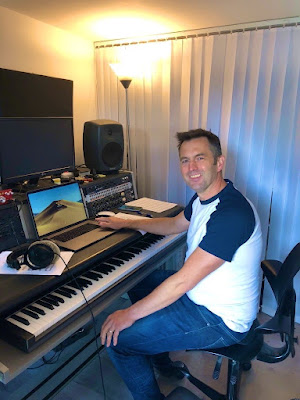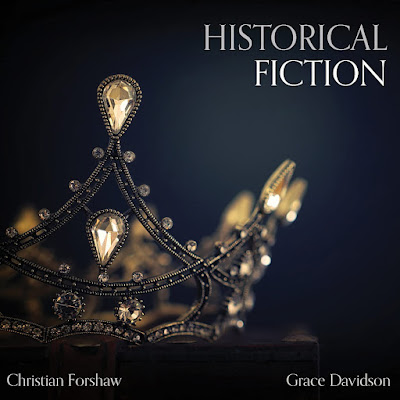 |
| Christian Forshaw & Grace Davidson (Photo Andy Staples) |
Historical Fiction is the latest collaboration between saxophonist and composer Christian Forshaw and soprano Grace Davidson. Whereas their previous work together has focused on Christian's own compositions, Historical Fiction issued on Integra Records, the disc sees them join forces with organist Alexander Mason for a series of arrangements and reinterpretations of Baroque classics. I recently met up with Christian and Grace to find out more.
The idea for music written for soprano, saxophone and organ is one that has gradually evolved for Christian, since the 1990s he had been experimenting with various combinations of instruments, finding his voice. The combination of saxophone and organ is one that Christian likes. He has a friend who is an organist and Christian discovered he liked the way the saxophone sits with the organ's sound, bringing flexibility to the essentially static instrument. Then a festival in Knaresborough (where Christian comes from) asked him for a work for choir, saxophone and organ, and this evolved into the idea for solo voice, saxophone and organ.
Christian and Grace have been collaborating, on and off, for around 17 years, a sort of piecing together of their particular specialities of Baroque music and contemporary, whilst Christian comments that voice and saxophone has been an evocative combination in the past and he cites American jazz saxophonist Stan Getz' work with the Brazilian singer Astrid Gilberto, the way one can take over from the other like two voices except that Grace is also working with the text whilst Christian's saxophone brings something else. The resulting performances on the new disc are very much duets, with each imitating the other, and the disc also includes solo numbers for both Grace and Christian.
Historical Fiction is not a specific product of last year's lockdown, it would have happened anyway but what 2020 gave Grace and Christin was more time so that the development process was far more organic than it might have been otherwise. They were able to develop the arrangements as part of the recording process. Rather than planning everything in advance and then simply taking three days to record, they could be more organic and Christian points out that this is the way artists such as Brian Eno work. This degree of artistic control also meant that they became very self-critical, obsessing over details. A trait both performers evidently share, wanting things to be exactly right.
Some pieces, such as 'Eternal source of light divine' from Handel's Ode for the Birthday of Queen Anne are performed virtually unchanged. With 'Eternal source' the only changes being the instrumental solo changes from trumpet to saxophone, and the key was altered so that the piece (which was originally written for an alto) sits in the middle of Grace's soprano voice. Whilst Grace sings the vocal solo just the way she would for a Handel performance, the recording is quite close-miked and the resulting ambience creates a different sound world.
But some items on the disc such as Orlando Gibbons' The Silver Swan are startlingly different to the original, Christian stripped Gibbons' madrigal down to just the melody and essential harmony and then rebuilt his own version over these. In this arrangement, as with many of them, Christian tries not to be over-complex and looks for the core of where the music lies. Here, the saxophone can be heard as the voice of the swan, but what Grace sings is the music written by Gibbons.
The repertoire on this album is rather different to their previous collaborations, where the music was largely by Christian though they have explored music by Dowland and Hildegard of Bingen. Historical Fiction uses the same key ingredients as their previous albums together but takes them to a different place.
When planning Historical Fiction they started with a long list of around 30 works, some pieces that Grace had already sung and others which Christian wanted to explore. Then Christian did mock-ups of possible versions, trying to find a way into the music so that as a composer there was something he could bring to the piece without spoiling it, creating an arrangement in his style without marring the original. Some pieces just didn't work, Christian felt he was shoehorning himself into the work. But other pieces, they were able to see from a different angle, and many of the original keys were changed, often when they trying things out in the studio.
The idea behind the key changes was to find the best place in Grace's voice that suited the music, and where she could bring the text out. In terms of performance, Grace sang the music just as she would with a period performance ensemble and with the same type of ornamentation, only she was singing alongside different performers and was rather closer miked. They launched the disc at a concert at Temple Church when performing live, Grace sings out rather more and they are happy that the recording is its own thing.
 |
| Christian Forshaw in the studio |
There are three concerts planned based on Historical Fiction, the launch at Temple Church (28 September 2021), a performance at the New Paths Festival in St Mary's Church, Beverley, and at James MacMillan's The Cumnock Tryst (2 October 2021). At this last festival, Christian gives a concert with Tenebrae, conducted by Nigel Short (who is Grace's husband). They are grateful that after such a long silence, it is all happening and that the performances are selling out. And they point out that the format of the concert, with just three performers, is very manageable. There are also ideas for further concerts next year.
Their collaboration came about almost by accident. Their first collaboration was on Christian's second album, Resonance. He explains that this came at a confused time in his career, he had signed a deal with Sony but realised that this was not for him, he did not like making music to order. So he bought back the rights to the album he had and started his own label. For Resonance, he had booked a small chorus of soprano, including one Grace Davidson. The booked soprano soloist was ill, and Grace stood in at the last moment and Christian liked what he heard. They had never met before this, but the sound of her voice in his Dowland arrangement was just what Christian had had in mind.
Laughingly, Grace adds that her remembrance of the event is cancelling a hair appointment so that she could record the solo part. As a result, they toured together and musically just clicked, and have performed on and off ever since, some years more than others. There are further coincidences, their eldest children were born three days apart.
Another collaboration on the stocks is an album of folk music. This has already been recorded and is planned for release next year (once Historical Fiction is properly launched). The music in this disc is a suite of folk music arising out of music written for three separate visits to the Lindisfarne Festival, and as well as Grace and Christian, the disc involves other instrumentalists including a bass clarinet and a marimba.
 |
| Grace Davidson and Christian Forshaw |
A big influence on Christian has been his teacher John Harle, who inspired the way Christian uses his saxophone in a classical manner, though he does not perform straight transcriptions, he is both a composer and a performer. Another influence is straight choral music, Christian was a choirboy and he loves the sound and names the choir of St John's College, Cambridge as his favourite choir, for the choir's warmth and heard (and in fact, Grace's son is a treble there at the moment). But he also loves heavy rock, and listened to a lot of Van Halen and White Snake, and enjoys the power of the music, the way the guitar rings out, and for Christian, the sound of a church organ on full stops has the same intensity, so that in 'Majesty' on Historical Fiction Christian battles against the full organ.
Christian regards himself as a saxophonist who composes, saying that he writes to create a place where his saxophone sound can be heard.
A big influence on both Christian and Grace is the voice of soprano Sylvia McNair, and both would choose the same movement of her recording of Mozart's Mass in C minor, conducted by John Eliot Gardiner, as their desert island disc, and in fact, both Christian and Grace heard it at similar times in the lives. Christian feels that McNair has a soulful connection to the music, whilst Grace also loves the fact that McNair sings jazz as well and is comfortable flipping between styles.
Grace loves the fact that her own career mixes both Baroque and studio performances of contemporary music and arrangements. This year, Grace has sung a lot more contemporary stuff, because that is what has been possible through Baroque performances are returning to her diary this Autumn including Handel's Messiah with the Academy of Ancient Music. She would be happy only performing Bach and Handel, but loves mixing things and in a normal year she splits her time roughly 50/50 between Baroque performance and contemporary studio work. She uses the same voice for both; when singing contemporary works she is not doing anything that strains or compromises the sound, it is just that her particular vocal sound fits with that composers are looking for.
Never miss out on future posts by following us
The blog is free, but I'd be delighted if you were to show your appreciation by buying me a coffee.
Elsewhere on this blog
- Giacomo Meyerbeer and his family: Between two worlds - A book which steps back from Meyerbeer the composer to place him in his family and society context, looking at what it meant to be part of a distinguished German Jewish family - book review
- From letters by Edna St Vincent Millay and Emily Dickinson to pictures by women artists, composer Juliana Hall's inspirations are highly diverse in this disc of four of her song cycles - record review
- Calum Builder's Messe (You are where you need to be): A work which deconstructs the Latin mass to explore the composers own journey, deconstructing and reconstructing his relationship to faith - record review
- Fleur de mon âme: Karen Cargill and Simon Lepper in a terrific recital of 19th and 20th century French song - record review
- From Rinaldo to Amadigi di Gaula: a look at Handel's highly experimental early London period - feature
- An engaging young Papageno and fine international cast, David McVicar's production of Mozart's Die Zauberflöte is in fine health at Covent Garden - opera review
- Lyric intensity: Gluck's Paride ed Elena (Paris and Helen) receives its first London staging from Bampton Classical Opera - opera review
- Shall we gather: Lucas & Irina Meachem's new disc celebrates American art songs & helps promotes representation & diversity in the arts through their new foundation - interview
- On DSCH: Igor Levit combines large-scale works by two two highly independent, creative minds, the Russian Dmitri Shostakovich and the Lancastrian-born Scot Ronald Stevenson - record review
- Die stille Stadt: Dorothea Herbert's debut recital explores songs by three Viennese contemporaries, Alma Mahler, Franz Shreker & Erich Wolfgang Korngold - record review
- A very personal sound commentary on 2020: Tim Corpus' MMXX - record review
- Combining Western classical with Native American musical culture: I chat to composer Jerod Impichchaachaaha' Tate - interview
- Home


.jpg)









No comments:
Post a Comment